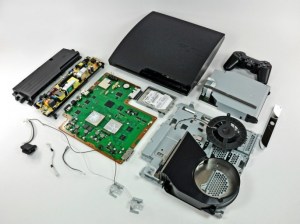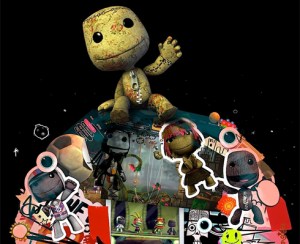You can find the first part of my talk with Ted Price right here: The Playstation and Me: Ted Price, part 1. Continuing the discussion of Price’s history with video games and Playstation, the chief Insomniac speaks on making the most of the PS3 processors, what they learned from Resistance 2 and his love of LittleBigPlanet.
One of the things I’ve heard through various iterations of the Playstation consoles is that they’re notoriously difficult machines to program for, like to manage memory. And I’m asking the people that I’m talking to if that’s a fair assessment. Do you feel like you had some hurdles to jump initially? Or was it easier than people tend to say? I mean, going from PS2 to PS3.
Well. I think easy is one of those slippery words, because game developers have a real need to get the most they can out of whatever hardware they’re using. And the Playstation–no matter which one you’re talking about–have always been called a hardcore engineer’s platform.
If you really like getting down to the metal and low-level programming, you can have machines do amazing things. If you’re coming from a PC background, where you have a lot more memory available and a development environment that’s perhaps a little bit more straightforward, the transition is more difficult. However, for the guys who have joined Insomniac over the years, most of them on our engine team are hardcore engine programmers who love what the Playstation consoles provide in terms of just raw power.
So it’s pretty much like you have to get your hands dirty in order to really maximize what you get out of it?
 Yeah. Probably the best example is the Playstation 3, where it has a complex architecture, and to really take advantage of it, you’ve got to be putting processes on the SPUs. You can’t put everything on the CPU or else your program will not run fast. It’s designed essentially for parallel processing. That’s the whole beauty of the machine. But if you are coming from a different paradigm where you’ve been working on say, just three cores at once, you haven’t dealt with SPUs, it’s sometimes hard for people to wrap their head around.
Yeah. Probably the best example is the Playstation 3, where it has a complex architecture, and to really take advantage of it, you’ve got to be putting processes on the SPUs. You can’t put everything on the CPU or else your program will not run fast. It’s designed essentially for parallel processing. That’s the whole beauty of the machine. But if you are coming from a different paradigm where you’ve been working on say, just three cores at once, you haven’t dealt with SPUs, it’s sometimes hard for people to wrap their head around.
The other thing about Sony has been the way they’ve kind of culturally shifted media consumption at least with the PS2 and the PS3. The PS2 helped the whole DVD format get adopted in homes and Blu-ray in the PS3. Even going to a CD based media on the PS1, I think it changed the way people thought about a game machine. What was that experience like for you? Do you think this is something they intended from the get-go with each machine? Or was it something accidental?
It’s hard for me to comment on the PS1 because Sony wasn’t the first hardware manufacturer to use CDs. But I do think it was the logical choice because CDs can store so much more information than a cartridge and were so much cheaper. It was kind of a no brainer. When the Playstation 2 started using DVDs, I think, yeah, there probably was a lot of thought given to the fact that not only can you fit more data on a DVD for games, you can also take advantage of its movie-playing capabilities.
Because at the time the Playstation 2 came out, DVDs were the newest thing. They provided higher resolution movies, or better movie viewing experiences. And for people who wanted one entertainment system in their living room, the PS2 provided it all. And then the same thing happened with the Playstation 3. It was really, the best and cheapest Blu-ray player on the market. So if you are a videophile and you want to have an amazing movie experience at home, well, really at the time when the Playstation 3 came out, there weren’t any other choices. You bought a Playstation 3. And the additional benefit was that hey, you get to play some great games on it as well if you’re a gamer.
Let’s shift gears a little bit and ask about Insomniac’s relationship with Playstation. Because two times out now you guys have been very closely wedded to Playstation. I mean, Ratchet & Clank pretty much became Playstation mascots for awhile. And obviously Resistance has been a huge franchise for the PS3. So, at what point did you feel like, OK, we can trust Sony in a long-term relationship moving forward and making games for their platform? Can you peg your closeness to Sony up to a particular point?
Yeah, I think that it was during Spyro. When we started working with people like Grady Hunt, Connie Booth and Greg Phillips, up at Sony in the early days, we immediately forged a strong bond with them. And this is their production team that I’m talking about in particular. Because we both were looking at game design the same way. More importantly, though, they had a really great understanding of the developer/publisher relationship. They saw it as we did, as symbiotic, where we both have our roles to play. We make the games. They’re there to help us in anyway they can. To give us feedback. To keep us from getting too myopic. And it has worked beautifully over the last 13 years.
You mentioned myopia as a danger. One thing I constantly hear from talking to developers is that they have no idea what other people are doing, how a game is going to come out, how it’s going to look in comparison to our stuff. Do you feel like that’s something that a publisher should help with?
Absolutely. I think that it’s not just publishers that can help, but it’s actual consumers. We as developers are always looking for outside feedback on what we do because it’s way too easy to get attached to your creations and start drinking your own Kool-Aid. And if we are going off course with a game design idea, and what we’re creating ultimately becomes our little pet project, it isn’t good for business. We want outside feedback on whether or not the game ideas we are implementing are viable.
So, we rely on our producers at Sony to give us feedback. We rely on feedback from the community, from the Insomniac community, from the game community in general. And we also rely heavily on usability tests and focus testing. Because we know that even if a game is easy to play for us and makes sense to us, it may not make any sense at all to somebody who’s seeing it for the first time, and it may not be interesting to them. So, from the very beginning of any kind of game development, we’re always looking for guidance from various areas.
It’s funny that you mentioned drinking your own Kool-Aid because the first thing I thought when I saw the Resistance 3 teaser was that, “Wow, this is really far afield from anything that we’ve ever seen in a Resistance game. I know you are not at liberty to talk about a bunch of that stuff. But, can you talk about your state of mind coming out of Resistance 2, seeing the reception, and going into Resistance 3?
[vodpod id=Video.4250376&w=425&h=350&fv=%26rel%3D0%26border%3D0%26]
Sure. Yeah, I can talk about that. When we developed Resistance 2, we took a lot of risks in terms of changing up some of the core mechanics, and we expanded the scope of the game significantly by including 60-player multiplayer, eight-player co-op, and a fairly large single-player campaign. And we knew that we were running a risk of alienating some of our hardcore fans, and after we released the game, they spoke up. They told us in pretty clear terms what they liked and what they didn’t. As with all of our games, we took that advice to heart when we began developing Resistance 3. So what you’ll see in Resistance 3 reflects a lot of what we knew we wanted to improve for the franchise in general, but also a lot of what consumers had to say about Resistance 2 and Resistance 1.
So going back to Playstation, outside of your experience as a developer, what were the things that you as a player really admired about the games that came out for the platform?
I have always been most impressed with the first-party games that have been released. I think when you look at last year’s releases in particular, games like Uncharted 2, that one really stands out. Games like LittleBigPlanet, which came out the year before.
Those are two that we still play in my house pretty frequently. And all the other first–party games, they are consistently top quality. And that is something that is unique about the Playstation versus the other consoles. When I say top quality, I’m not just talking about visuals, I’m talking about audio, I’m talking about game design, I’m talking about story, I’m talking about in LittleBigPlanet’s case, their approach to user-generated content. I think that–and again, I’m biased because we’ve been developing for the Sony platform for so long–but I think that Playstation first-party titles break a lot of new ground.
Can you give examples of that?
 I’ll use LittleBigPlanet again. I don’t think any console game has done as much to support user-generated content as LittleBigPlanet has. Before it came out, many of us at Insomniac were scratching our heads about how one could possibly create a toolset that would be easily accessible by any gamer and how one would control content that is created in one’s home and then uploaded to the Internet. But Media Molecule figured out how to do it, and as a result, LittleBigPlanet is one of those games that you can play forever because there’s new content appearing all the time. Everyday, there are new levels being put up, new things to experiment with. It’s amazing.
I’ll use LittleBigPlanet again. I don’t think any console game has done as much to support user-generated content as LittleBigPlanet has. Before it came out, many of us at Insomniac were scratching our heads about how one could possibly create a toolset that would be easily accessible by any gamer and how one would control content that is created in one’s home and then uploaded to the Internet. But Media Molecule figured out how to do it, and as a result, LittleBigPlanet is one of those games that you can play forever because there’s new content appearing all the time. Everyday, there are new levels being put up, new things to experiment with. It’s amazing.
And you’re saying that’s not just an investment on Media Molecule’s part, it’s also an investment on Sony’s part. They’re saying, “OK, we’re going to support this.”
Yeah. Because there’s a lot of infrastructure that has to be put in place to support that kind of content. I mean, those levels exist somewhere, they’re existing on Sony’s servers, and again, there’s a lot of behind-the-scenes work that has to be done to make sure that when you do upload something you have a good experience. That you’re not seeing content that’s inappropriate. I mean, the list goes on. So it was not a small challenge at all. But these guys managed to tackle it and succeed.

